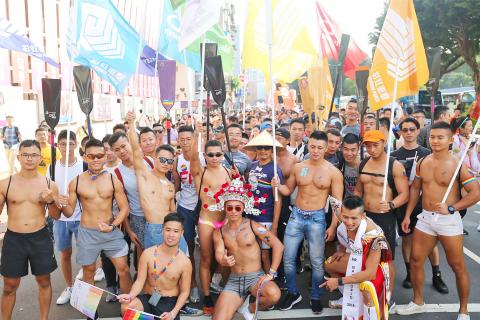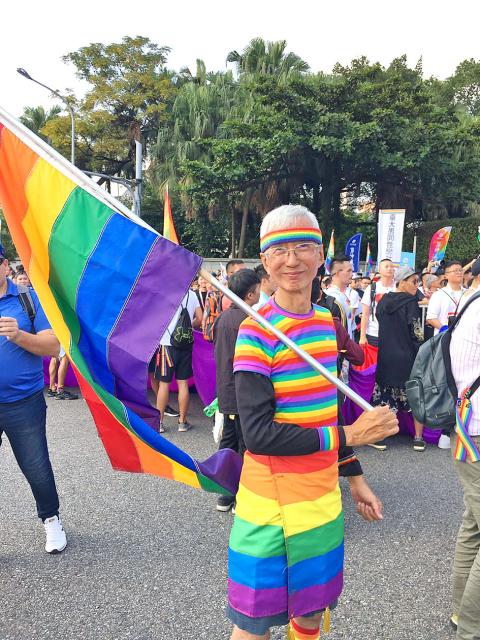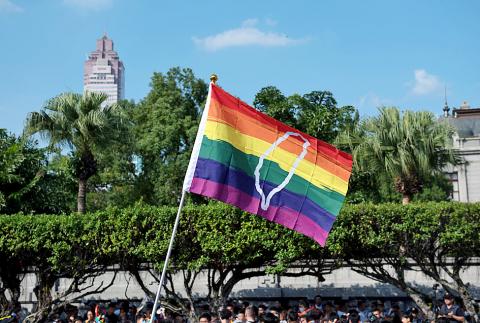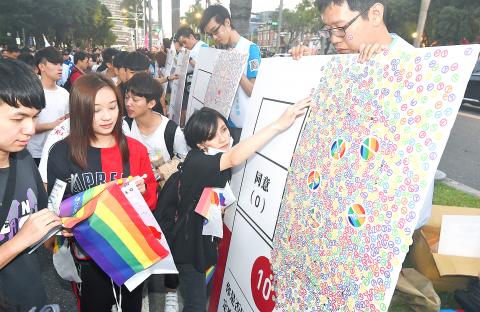Nearly 140,000 people from home and abroad yesterday marched through the streets of Taipei in support of better protection of lesbian, gay, bisexual and transgender (LGBT) rights, calling on Taiwanese voters to “vote for equality” in the five LGBT-related referendums tied to next month’s local elections.
Taipei’s skies were filled with rainbow flags, as participants departed from Ketagalan Boulevard at 2:30pm and headed in three different directions, before congregating back on the boulevard.
According to the rally’s organizers, Taiwan LGBT Pride, the march, now in its 16th year, attracted about 137,000 people, up from last year’s 123,000.

Photo: CNA
Due to the annual parade’s growing popularity in Asia and the world, there has been increasing racial, age and occupational diversity among the participants, the organizers said.
The theme this year was “Tell your story, vote for equality,” as the organizers wanted to draw attention to the importance of gender equality education, while urging young Taiwanese to vote in the referendums on Nov. 24 “to safeguard the rainbow,” said a Taiwan LGBT Pride Community general coordinator, who only identified himself as “Hsiao Pai” (小白).
The five referendums, three of which were initiated by anti-LGBT groups, could decide whether the government would legalize same-sex marriage and whether LGBT-inclusive education will be taught in elementary and junior-high schools.

Photo: Yang Mian-chieh, Taipei Times
Mickey Liu (柳皓恩), 26, who joined the march from Hsinchu, said his parents have known he is gay since he was 19.
“When they found out, our relationship went through a rough period. However, as they learned more about the LGBT community, they came to understand and accept it,” Liu said.
A 48-year-old Japanese man who declined to disclose his name said that he came to Taiwan just for the parade and that he found Taiwanese to be “very nice and open” to people with different sexual orientations.

Photo: EPA / Dave Mark Meguiso
Asked whether he hopes to attend such a parade in his country one day, he said that Japan “is not there yet.”
Liam Arne, a 22-year-old American who has been living in Taiwan for three months, said he is happy to see the progress the nation has made in improving LGBT rights.
European Economic and Trade Office Director Madeleine Majorenko said it was her fourth time attending the Taiwan LGBT Pride Parade, which she called “the greatest party ever.”

Photo: CNA
British Representative to Taiwan Catherine Nettleton said Taiwan is a progressive society in various aspects, with a thriving democracy and media.
She said she hopes the progress made on the issue of marriage equality will evolve into a solid result.
German Institute Taipei Director-General Thomas Prinz said the parade alone is a symbol for a free and democratic society, adding that changes take time and that Taiwan is headed in the right direction.

Photo: Liao Chen-huei, Taipei Times
Prior to the start of the parade, more than 30 church leaders, pastors and theologians from 13 nations, including the US, the Philippines, India, South Korea and Singapore, gathered on the boulevard to voice support for the nation’s lesbian, gay, bisexual, transgender, intersex and questioning (LGBTIQ) community, expressing the hope that the nation sets an example by liberating people who are being oppressed due to their sexual orientation.
The participants included US bishop Yvette Flunder, Malaysian Pastor Ngeo Boon Lin, who is Asia’s first openly gay clergy member with a doctorate in theology, Japanese transgender priest Ambrosia Goto Kaori and Indian intersex social activist Daniel Medonca.
Flunder said people would know that the spirit of God is upon them when they choose to liberate people from bondage, choose relationships over religion, and set people free instead of putting them in chains.
“To all of those who are suffering from the oppression of the church, let me be a witness to you today... I have been in a relationship with my partner for 34 years. She and I got married in the US as soon as we could,” Flunder said.
The participants read out a statement expressing their belief that the heart of the gospel of Jesus Christ is radical love, justice and inclusion, and that each person is precious to God because they are all created in His image.
“We recognize there are people with diverse sexual orientations, gender identities, gender expressions and sex characteristics. We affirm that being LGBTIQ is not a psychological disorder, a mental illness, immoral, evil, sinful or depraved — it is simply a reflection of the amazing diversity that God has created,” they said.
Taiwan LGBT Family Rights Advocacy executive secretary Li Jui-ping (黎璿萍) said that she has been a Christian since junior-high school.
"However, I later left the church because after the pastor found out about my sexuality, he told my parents that I was abnormal,” Li said.
Despite the incident, Li said she has remained a Christian because what she believes in is Jesus Christ and that through him, she sees a family.

Seventy percent of middle and elementary schools now conduct English classes entirely in English, the Ministry of Education said, as it encourages schools nationwide to adopt this practice Minister of Education (MOE) Cheng Ying-yao (鄭英耀) is scheduled to present a report on the government’s bilingual education policy to the Legislative Yuan’s Education and Culture Committee today. The report would outline strategies aimed at expanding access to education, reducing regional disparities and improving talent cultivation. Implementation of bilingual education policies has varied across local governments, occasionally drawing public criticism. For example, some schools have required teachers of non-English subjects to pass English proficiency

‘FORM OF PROTEST’: The German Institute Taipei said it was ‘shocked’ to see Nazi symbolism used in connection with political aims as it condemned the incident Sung Chien-liang (宋建樑), who led efforts to recall Democratic Progressive Party (DPP) Legislator Lee Kun-cheng (李坤城), was released on bail of NT$80,000 yesterday amid an outcry over a Nazi armband he wore to questioning the night before. Sung arrived at the New Taipei City District Prosecutors’ Office for questioning in a recall petition forgery case on Tuesday night wearing a red armband bearing a swastika, carrying a copy of Adolf Hitler’s Mein Kampf and giving a Nazi salute. Sung left the building at 1:15am without the armband and apparently covering the book with a coat. This is a serious international scandal and Chinese

TRADE: The premier pledged safeguards on ‘Made in Taiwan’ labeling, anti-dumping measures and stricter export controls to strengthen its position in trade talks Products labeled “made in Taiwan” must be genuinely made in Taiwan, Premier Cho Jung-tai (卓榮泰) said yesterday, vowing to enforce strict safeguards against “origin laundering” and initiate anti-dumping investigations to prevent China dumping its products in Taiwan. Cho made the remarks in a discussion session with representatives from industries in Kaohsiung. In response to the US government’s recent announcement of “reciprocal” tariffs on its trading partners, President William Lai (賴清德) and Cho last week began a series of consultations with industry leaders nationwide to gather feedback and address concerns. Taiwanese and US officials held a videoconference on Friday evening to discuss the

PERSONAL DATA: The implicated KMT members allegedly compiled their petitions by copying names from party lists without the consent of the people concerned Judicial authorities searched six locations yesterday and questioned six people, including one elderly Chinese Nationalist Party (KMT) member and five KMT Youth League associates, about alleged signature forgery and fraud relating to their recall efforts against two Democratic Progressive Party (DPP) legislators. After launching a probe into alleged signature forgery and related fraud in the KMT’s recall effort, prosecutors received a number of complaints, including about one petition that had 1,748 signatures of voters whose family members said they had already passed away, and also voters who said they did not approve the use of their name, Taipei Deputy Chief Prosecutor